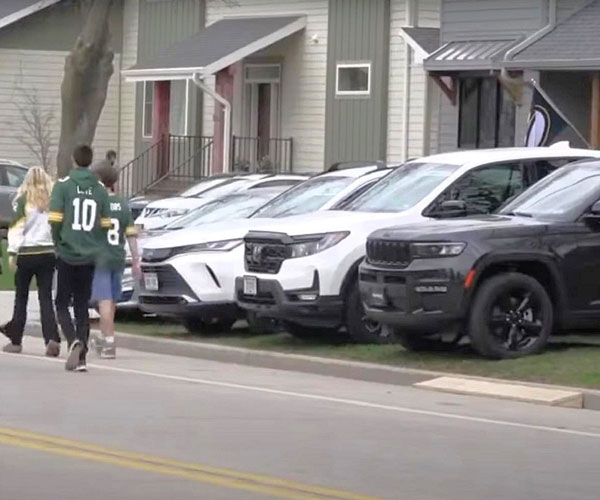When kids packed up their pencils and headed back to school this fall, Kele Storhm was among them for the first time. He's going to kindergarten and it marks a big, exciting change in his young life. It's also the start of something new for his dad.
Since Kele was born 5 1/2 years ago, John Storhm hasn't had many hours to call his own, serving as the full-time, stay-at-home parent while wife and mom Kathy Hessler returned to the faculty of Case Western Reserve University School of Law.
John, an environmental activist whose post-college career path led him to a poorly paid dream job with Greenpeace, is still deciding what to do with his newfound freedom. There's a book he wants to write and computer skills to upgrade so he can run a technology-based business out of their Cleveland Heights home.
"I'm starting to think about my future," he says. "But whatever I do, it will have to fit in around Kele's schedule. Taking care of him is my priority."
They'd ruled out day care or baby sitters long before Kathy got pregnant. And since she was making more money, she says, "it just made sense that I'd go back to work.
"Besides," she continues with a laugh, "I think John's more easygoing than me and better suited to the demands of day-to-day parenting."
"What we're doing may seem radical to some people," adds John, who helped start a group for dads on daytime duty at Heights Parent Center three years ago. "But it's simply a rational decision about what's best for us."
The social acceptance of such arrangements has soared, says Stephanie Coontz, director of research and public education for the Council on Contemporary Families, and author of a new book titled "Marriage, A History."
According to the U.S. Census Bureau, there are only 98,000 at-home dads, not including fathers who take care of their kids while attending school or working out of their house; caregiving dads who are disabled, retired or unemployed; and share-care households where dads man the homefront by day and work at night. A more realistic estimate is about 2 million, says Peter Baylies, founder of the online At-Home Dad Network and author of "The Stay-at-Home Dad Handbook."
"Ten years ago, when a guy announced that he was staying home to care for his kids, it was considered strange," Baylies says. "Now it's merely unusual and seen in a positive light."
And kids may be the big winners, according to Dr. Robert Frank, professor of psychology at Oakton Community College in Des Plaines, Ill., who's studied at-home-dad families. Children form equally strong attachments to both parents and feel comfortable turning to either for help and support.
That may surprise those who think women have an innate ability to dispense love and cookies, or that men are clueless when it comes to child-care basics. "Women don't naturally possess the required skill set," says Scott Coltrane, professor of sociology at University of California, Riverside and author of "Family Man: Fatherhood, Housework, and Gender Equity." "Experience is the best teacher."
Just like their female counterparts, at-home dads have their good days and bad. In books, blogs and chat rooms, they talk about loving almost everything about being with the kids but confess that stubborn 2-year-olds and moody tweens can try the patience of a saint.
Meet four other local couples who share the ins, outs, ups and downs of trading places.
At 6-foot-6 with more earrings than I can count, a shaved head and a goatee, Mike Billings, 47, doesn't look like anybody's idea of a typical dad. But at Lakewood's Family Room, where he's been a regular with his 4-year-old daughter Gabrielle since she was a baby, Mike serves snacks, ties shoelaces and pushes kids on the swings. And when one of his "little buddies," as he calls them, takes a tumble, he bends down, gently picks up the crying child, and offers hugs and comfort.
"I notice that at first women presume I don't know what I'm doing," he says. "The good thing is that they have very low expectations, so anything I do right earns me plenty of praise."
But Mike's had plenty of practice with child care and housework. When both he and Barb worked after daughter Bronte was born 12 years ago, he "was always the one who did the cooking and the shopping in our two-career household," Mike says.
Still with 40-plus hour workweeks and Bronte in day care, "the daily pressure of getting her up and out, and picked up, was incredible," says Barb. "I'm the type of person who needs to work outside the home, but I always felt guilty about it."
With Gabrielle's arrival, Barb left her job as head of reference at the Western Reserve Historical Society for a less demanding, more flexible position as a high school librarian. Mike, who had done bridge construction for 22 years, quit and used his retirement package to pay off their debts, making it possible to manage with only Barb's salary.
"We struggle financially," says Mike, "but it's worth it. There's nothing about the work world I miss, and I love being with the girls. If I had it to do over, I'd make the same choice. My only regret is that we didn't do this sooner."
Mike's moments of frustration have nothing to do with him being a man. "I try to be endlessly patient, but I don't always succeed," he says. "It's the same for me as it would be for any stay-at-home mom."
In the late-night hours, after the kids are asleep, Mike takes time to do other things he enjoys ó reading, playing the flute, composing and writing poetry. He's pursuing a master's degree in library science, and puts in some evenings as a reference assistant at Kent State University.
"The final proof that this was a good idea," adds Barb, "is that we're all happier."
Mark Corey takes a straightforward approach to raising his son, Cole: Have fun, don't worry and attempt to tire him out.
That got harder, he admits, after Cole, now 2, became mobile. "He started walking at 9 months and hasn't held still since," Mark says. "He's a real high-energy little guy."
When the weather is good, father and son often visit neighborhood parks morning and afternoon. (Cole especially likes one with a big grassy hill that he repeatedly races down.) Then there's playgroup, finger painting, a fleet of toy trucks to maneuver around the back yard and special activities such as trips to the zoo, weekly get-togethers for dads and preschoolers at Heights Parent Center and the center-sponsored Lunch Bunch meetings.
"He gets a second wind when Mom comes home from work," says Mark. "So he usually doesn't go to bed until 9. Then he's up at 8 in the morning ready to have a big breakfast and do it all over again."
The family lived in San Diego when Cole was born. Mark, 35, worked as an independent contractor for telephone and cable companies, and Jennifer took two months' maternity leave from her federal government job. When she returned to work, Mark's flexible schedule allowed him to handle things during the day and hand off the baby when Jennifer got home at 4 p.m.
"It was so expensive there that we couldn't consider not having both incomes," says Mark.
The couple relocated to Cleveland, Jennifer's hometown, a year ago to be near her mother. They're expecting their second child in December, and Jennifer found a job with the Department of Veterans Affairs. Northeast Ohio's lower cost of living gave them the option of living on her salary.
When the new baby arrives, Jennifer will take her 10 weeks' maternity leave and head back to the office. Mark will be in charge of diapers, dishes and their University Heights bungalow. "He never liked my cooking anyway," she says with a laugh.
And Mark's outgoing personality is a benefit to Cole. "I'm a shy person," Jennifer says. "I think being home with me would be too isolating for Cole."
But her husband is learning that when you're one of the few men at library storytime and playgroup, you don't exactly become one of the "girls."
"Figuring out how to make friends with moms I meet can be tricky," he says. "I don't want anyone to think I'm hitting on them."
So he's cautious, hesitant to initiate get-togethers and play dates. "Because of the normal dynamic between men and women," he adds. "I'm afraid my natural friendliness might be taken as flirting."
He also wonders how husbands might feel about their wives spending hours every week with another guy. And even though he pitches in at playgroup, treating all the kids as his own, he senses that the moms don't quite trust him in the same way they do one another.
"I overhear the ëthank yous' and the ëcan yous' every week," he says. "They ask each other to baby-sit, but not me. Part of it may be that they've known each other longer. But I think some of it is that they are not completely at ease with the idea of a man caring for their children. It's not anti-guy, but they are clearly not as comfortable with me as they are with other mothers, so I don't push."
Still, Mark speculates that perhaps it's a good thing nobody else counts on him to watch their children. His life is about to get more complicated with the arrival of a new baby. He's going to have to do parental multitasking, keeping an infant fed and dry while keeping 2-year-old Cole entertained. But he's ready, willing and able. In fact, he's looking forward to it.
Since Anita Gutierrez, 41, can't be with her kids while she's at work, her husband, Luis, sends a little piece of home to the office.
"Even though Anita loves her job [at Moen], I know she misses the kids a lot," says Luis, 48, who left the work force to become a full-time parent in 2002. "So I started taking digital photos of them and e-mailing the pictures to her at work. It helps her feel connected to us, the things we do, and the funny things that inevitably happen."
Like the time 4-year-old Alex, then a toddler, sat proudly on the floor in a sea of Kleenex. "I left him alone for a minute while I went into the kitchen," says Luis. "When I got back he had taken every single tissue out of the box."
Luis got his camera, and the practice of sending snapshots has become an almost daily ritual.
The couple has been married five years and Luis is at home with Alex and 1-year-old Sophia. And he's there when Madeline, 14, and Claire, 12, Anita's two daughters from a previous marriage, get back from school.
That suits Luis just fine. "I'm a creative type, interested in writing and photography. Becoming a full-time father was the first step in fulfilling a fantasy I'd always had of working out of the house."
But for now, the kids come first. "They need my attention," Luis explains. "I know that and I'm cool with it, so there's no conflict between their needs and mine. Taking care of them is what I want to be doing."
But when the baby is napping and Alex is playing with the neighbor's children, he writes for The Lakewood Observer and makes portraits of his friends. "I can never predict what will be required day to day. The trick is to accept the way things go and stay flexible."
Luis, who calls himself Lakewood's only French-Cuban resident, says he had a great model in his father, "an unusually loving and affectionate man," who was very involved in raising him and his brother. He's also motivated by a desire to support his wife's career ambitions. According to Anita, a side benefit of their arrangement is that the children are growing up without stereotypes about men's and women's roles. And because she's walked a few miles in his shoes, Anita has a better understanding of his situation.
"I've been a full-time mom," she says. "I know what it's like. So I'm really appreciative of everything he does, including having dinner waiting for me when I get home from the office."
Family life has been complicated by serious health problems. Luis was diagnosed with cancer a year ago. He earned the designation cancer survivor but struggled with a recurrence this summer.
"The whole experience has been a gift," Luis says. "I've had a chance to be a big part of our children's growing up. How many dads can say that? And now, more than ever, that means a lot to me. "
Becky and John Rinaldi
Cleveland Heights
John Rinaldi hasn't quite mastered the intricacies of hair braiding. And he's still baffled by 3-1/2-year-old Elena's habit of changing her clothes four times a day. But he's only been handling things at home for a year, so he deserves some slack. Which is not to say he lacks the required skills. He's a whiz at separating Transformer pieces from Barbie gear, is a good cook and has a way with laundry.
"John took over the washing a long time ago," says his wife, Becky, "because I'm a waiter.' That means I wait until everybody runs out of clean clothes. He likes to do a little every day, just like his mother."
In the nine years since Abbey was born (quickly followed by Evan, 8), Becky and John tried various approaches to managing careers and family. Initially both worked: John helped manage Rinaldi's, his parents' jewelry store, and Becky did training and leadership development for OfficeMax. A big chunk of their income went to child care. So did a lot of their energy.
"It felt like we were constantly on the run," John explains, "dropping Abbey and Evan off at the sitter's, picking them up and rushing to make supper."
So Becky quit to be with the kids. In addition to his day job, John started working a few nights a week waiting tables. After eight years in the family business, he was looking for a change and left to become a restaurant manager.
"I was always tired and even with two jobs we still didn't have enough money," explains John. When the restaurant he was managing closed, he and Becky were both looking for work: Whoever got something first would take the job and the other would stay home. John landed another restaurant management spot. But a few weeks later Becky was offered her old position with OfficeMax. The hours were predictable and the benefits were great. She accepted it and once again the couple traded places, though John still puts in a few nights a week as a server at a Solon restaurant.
"We're living pretty close to the edge, financially," John says. "We've given up having new cars, a bigger house and a better TV. We can't take extravagant vacations. But what we get instead is quality of life for ourselves and our children."
Although he looks like the kind of guy who's happier in his Godzilla T-shirt than he would be in a suit, it was tough for John to get used to not having the routine of going to work and the reward of getting a paycheck. But he's found that he likes being home and taking care of the house. John's built a new mantel for the fireplace and refinished the kitchen floor. He has plans to put up a pergola in the back yard ó that is, if they don't end up moving now that OfficeMax is relocating its corporate headquarters.
Becky's enthused about being back in the work force but admits she misses summer days at the pool, museum outings and volunteering in the classroom. And being in charge. An at-home veteran, she often has the impulse to offer John advice. But she's realized that her husband needs to do things his own way, including splurging at the grocery store on cookies (for him and the kids) and beer (for him and Becky). "We are pretty similar in how we parent," she says, "but I've had to let go and accept that he's in control of the household, not me."
John's had to deal with a few unexpected little problems outside the house. Like public restrooms. There are rarely diaper changing facilities in the men's room. And it isn't any better now that Elena's potty-trained. "It's OK for women to take little boys into the ladies room, but I can't really bring Elena in with me. What's a guy supposed to do?"
John knows that he'll likely go back to work once Elena's in elementary school. So he's also using his time at home to re-evaluate his professional goals. "I didn't make the right career choices for myself in the past. This has given me a chance to figure out what I really want to be when I grow up. Because of what I've learned about myself in this year with the kids, I'm thinking about becoming a teacher."
"In a perfect world," says Becky with a laugh, "every father would stay home for a few months. They'd never again ask their wives, So what do you do all day?' "



